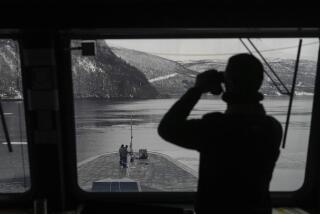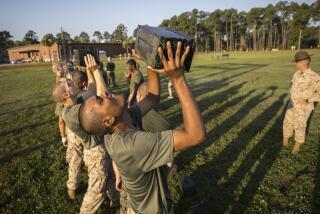Kuwait Exercise Puts Marines Where They Want to Be
- Share via
KUWAIT CITY — For the next month, the 1,000 combat Marines from Camp Pendleton who arrived here Tuesday by sea will be deployed where they say they want to be at times of crisis: at “the pointy end of the spear.”
“I’m out here doing the job I always wanted to do,” said Sgt. Brian Collins, 27, of rural Kansas. “We’re trained to move fast and shoot fast. If called, that’s what we’ll do.”
On the same trackless desert where U.S. forces routed the Iraqi army in 1991, troops of the 11th Marine Expeditionary Unit will conduct live-fire, day-and-night exercises to sharpen skills learned at a desert fighting facility near Twentynine Palms in San Bernardino County. A similar exercise was held in recent weeks at an undisclosed nation in the Persian Gulf region.
Although the Kuwaiti exercise, dubbed Eager Mace, was planned months ago, the escalating tension between the United States and Iraq has put the Marines at center stage of a geopolitical hot spot with an uncertain future.
The Marines say they wouldn’t want it any other way.
“It’s awesome to be here,” said Lance Cpl. Jason Hardy, 20, of Las Vegas. “We’re trained and we’re ready.”
Most of the enlisted Marines were in school during Operation Desert Storm. Some have sought out veterans of that 1991 campaign to hear what combat was like.
Cpl. Toby Reveles, 21, of Moreno Valley said a sergeant told him it was a lot like training, just much noisier. Reveles said he considers the current tension a lucky break.
“I envied the guys from the 15th [Marine Expeditionary Unit] when they got to go to Afghanistan,” Reveles said. “I wished I could have been there, but now maybe we’ll get our chance.”
When the joint exercise between Marines and the Kuwaiti military was planned, the goal was to bolster this desert emirate’s sense of security.
“We were sent here to show the Kuwaitis that we will never let 1990 [when Iraq invaded unopposed] happen again,” said Staff Sgt. Stephen Bright, 32, of Port Orchard, Wash. “Now things are different.”
The speed at which a U.S.-Iraq showdown appears to be approaching has taken aback some Marines. TV news is available only sparingly on ship, newspapers arrive days late, and Internet access is limited.
Many Marines and sailors say they have learned most of what they know about the conflict from e-mails sent by relatives and by that ever-present mode of military communication: scuttlebutt.
“It really surprised me,” said Lance Cpl. Israel Martinez, 28, of Big Spring, Texas. “I try to keep my mind focused on the training and not let the news get me all riled up. My wife is concerned, though.”
For some more experienced sailors and Marines, the mission here is deja vu. Russ Lindemann, command master chief aboard the dock landing ship Mount Vernon, noted that the last time he was in Kuwait was during Desert Storm.
“Ten years later, the same place, the same old problem,” he said while howitzers, tanks and light-armored vehicles were being unloaded from the vessel for a convoy to a site near Camp Doha, the Army’s rapidly expanding facility.
But for some of the youngest personnel, the trip to Kuwait City is new, with few reference points. As the Mount Vernon anchored briefly offshore, several sailors intently scanned the skyline of the capital, which is dominated by spires and radio towers.
“It looks like something out of the Jetsons,” said Machinist’s Mate Nicholas Richardson, 20, of Dallas.
For all the expressed eagerness of the young Marines, there were also expressions of hope that the high-profile exercise will act as a deterrent to war, a reminder to Iraqis of what happened the last time they met U.S.-led forces in combat.
One infantry officer, who is reading the works of Chinese philosopher and military strategist Sun Tsu, was struck by his dictum that the wise general finds a way to win a war without fighting.
“Good advice,” he said.
Cmdr. Steven Ritchie, commanding officer of the Mount Vernon, said he hoped two warships and a thousand Marines would get the attention of President Saddam Hussein and other Iraqis.
“We’re showing the flag,” he said. “By putting Marines ashore, we’re sending a signal to everyone about American resolve.” But if that signal is not received, said Ritchie, a veteran of Desert Storm, the U.S. military has other options.
“In order for deterrence to be successful, sometimes you have to swing the bat,” Ritchie said. “If we’re ordered, we’ll swing it and swing it hard.”
More to Read
Sign up for Essential California
The most important California stories and recommendations in your inbox every morning.
You may occasionally receive promotional content from the Los Angeles Times.













